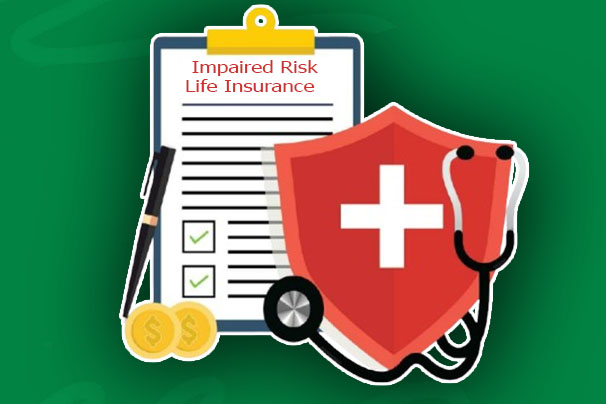Impaired risk life insurance, or substandard or high-risk life insurance, is a type of life insurance for persons with a higher risk profile. This classification is frequently associated with health-related difficulties, dangerous employment, or lifestyle decisions. The high-risk status can considerably increase insurance costs, making it more difficult to obtain cheap coverage.

Understanding impaired risk life insurance is beneficial for people who may fall into this category and want to protect their financial future. In this article, we’ll explore how life insurance companies calculate risk to help you decide whether impaired risk life insurance is right for you.
How Impaired Risk Impacts Life Insurance Rates
Life insurance companies analyze risk by considering age, gender, medical history, lifestyle, and occupation.
- Standard plus: Someone who qualifies for the standard plus group is likely to have good general physical and mental health, but they may be more difficult to cover than those in the preferred category due to their career, hobbies, or family health history.
Individuals with an average level of risk due to their health, lifestyle, and family history fall into the standard category. - Substandard: People in this category are likely to have health problems or a history of sickness and complications such as cancer, stroke, or diabetes.
Individuals that fit into the super-preferred and preferred groups usually get the finest deals. Common risk factors that prohibit you from being classified in a more advantageous class include:
- Diabetes
- Cancer
- Alcohol abuse
- Frequent trips to high-risk nations
- Weight and Overall Health
- Heart illness.
- High-risk hobbies and pastimes, such as drag racing, skydiving, and mountain climbing.
- Hepatitis C
- Rheumatoid arthritis.
- Stroke
- Tobacco use
Any of these variables, particularly a combination of them, may cause carriers to assign you to a lower risk class, but this does not mean you are disqualified for life insurance coverage. It may imply that your rates are higher, which is why shopping around for life insurance is critical because these rates might vary from insurance carrier to insurer.
Why do I need Impaired Risk Life Insurance?
Individuals with pre-existing or continuing medical issues may have difficulty finding an affordable life insurance plan. Many insurance firms consider persons with chronic health concerns to be “high risk” individuals, which results in increased premiums or even rejection of the life insurance application. Impaired Risk Life Insurance specialists work with high-risk individuals and understand which insurance companies provide the most competitively priced plans to meet each individual’s unique needs.
How to get Impaired Risk Life Insurance
Finding impaired risk life insurance can be difficult, but not impossible. Individuals with high-risk variables must take a well-informed approach to obtaining coverage.
Understand your risk factors
First, identify and comprehend your individual risk factors. These could be due to health issues, lifestyle decisions, or work dangers. Knowing these characteristics might help you locate the proper insurance provider and policy for your needs.
Research and compare insurance providers
Investigate numerous insurance businesses that provide plans for high-risk customers. Compare their coverage options, premiums, and life insurance underwriting procedures. Look for carriers who specialize in impaired risk life insurance, as they may offer more flexible plans.
Prepare for a detailed application process
Prepare for a thorough application procedure. This will most likely involve extensive medical surveys and, possibly, medical examinations. Accurate and full disclosure of your health and lifestyle will help ensure adequate and timely coverage.
Seek professional advice
Consider talking with insurance agents or brokers that specialize in high-risk coverage. They can provide important advice, guide you through the complex environment of impaired risk life insurance, and connect you with the best insurers.
Frequently asked questions
What is impaired life meaning?
Impaired life refers to a person’s physical state that falls below the standard requirements for life insurance coverage.
How is risk determined in insurance?
Historical Data Analysis: Insurance businesses rely significantly on historical data to evaluate risks. Past occurrences and claims provide useful information about the frequency and severity of various risks. This data-driven strategy enables insurers to make accurate forecasts regarding future events.
What is impaired policy?
An impairment policy is a common administrative regulation intended to reduce the risk of workplace risks caused by impaired workers.
Who calculates the risk in insurance?
Actuaries calculate insurance risks and premiums. Actuaries calculate the likelihood of numerous human life events, such as birth, marriage, illness, unemployment, accidents, retirement, and death.



